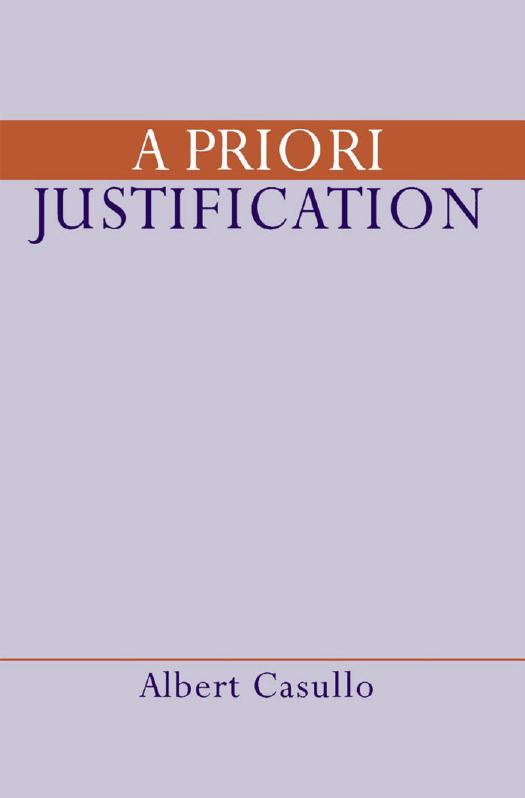A Priori Justification by Albert Casullo

Author:Albert Casullo [Casullo, Albert]
Language: eng
Format: epub, pdf
ISBN: 9780195115055
24. Quine, “Epistemology Naturalized,” 82–83.
25. Kim, “What Is ‘Naturalized Epistemology’?” 48.
end p.126
a metaepistemological argument and a substantive epistemological argument. Philosophical naturalists must offer a metaepistemological argument in favor of adopting naturalistic constraints on traditional philosophical projects. For example, they might argue, in the case of conceptual analysis, that naturalistically respectable concepts are better understood than those philosophers have traditionally favored. They must also offer a substantive epistemological argument in support of the particular naturalized analysis they endorse. For example, they might argue that the causal theory of knowledge more plausibly handles Gettier-type cases than any other available analysis. Analogously, scientific naturalists must offer a metaepistemological argument in favor of absorbing traditional epistemology into some scientific discipline, such as psychology, as opposed to continuing to pursue it as a separate discipline. They might, for example, argue that the lack of progress in solving traditional epistemological problems provides evidence that the enterprise is bankrupt. They must also offer a substantive epistemological argument in support of their particular naturalistic commitments. For example, they might argue that certain causal constraints on the acquisition of mathematical knowledge are supported from within the branch of science that is replacing traditional epistemology.
My focus will be on the question of whether there is either a substantive philosophical naturalist argument or a substantive scientific naturalist argument that supports a causal condition incompatible with knowledge of abstract entities. More specifically, I will address two questions. Have philosophical naturalists offered an adequate analysis of the concept of knowledge or justification that involves or entails a causal condition incompatible with knowledge of abstract entities? Have scientific naturalists offered compelling evidence, from within psychology or some other branch of science, that such a causal condition is part of our best scientific account of scientific knowledge?
My focus on the substantive arguments is supported by two considerations. First, if philosophical naturalists cannot offer a naturalized analysis of knowledge or justification involving a causal condition incompatible with knowledge of abstract entities, then the metaepistemological controversy over adopting naturalistic constraints on philosophical projects is moot for our purposes. Similarly, if scientific naturalists cannot offer evidence from within science that supports such a causal condition, then the metaepistemological controversy between traditional and naturalized epistemologists is moot for our purposes. Second, if philosophical naturalists offer a naturalized analysis of the concept of knowledge or justification involving a causal constraint incompatible with knowledge of abstract entities, the analysis must be evaluated on its own merits. If it is superior to its competitors, the analysis will stand on its merits apart from any more general commitment to philosophical naturalism. Similarly, if scientific naturalists offer scientific evidence supporting such a condition, the evidence must be evaluated on its own merit. If the evidence is compelling, the condition
Download
This site does not store any files on its server. We only index and link to content provided by other sites. Please contact the content providers to delete copyright contents if any and email us, we'll remove relevant links or contents immediately.
| Anthropology | Archaeology |
| Philosophy | Politics & Government |
| Social Sciences | Sociology |
| Women's Studies |
The Code Book by Simon Singh(3189)
Medea and Other Plays by Euripides(1444)
The Only Grammar Book You'll Ever Need: A One-Stop Source for Every Writing Assignment by Thurman Susan(1328)
Social Linguistics and Literacies by Gee James;(1147)
The Bostonians, Vol. II (Of II) by Henry James(1109)
The Dictionary of the Vulgar Tongue by Francis Grose(1099)
The Satyricon by Petronius(981)
The Fasti (Verse) by Ovid(956)
Essential Words for the TOEFL by Steven J. Matthiesen(948)
Idylls of the King by Baron Alfred Tennyson Tennyson(943)
The Playboy of the Western World by J. M. Synge(922)
Words Fail Me by Patricia T. O'Conner(916)
The Language Instinct: How The Mind Creates Language by Pinker Steven(870)
The Great Book of American Idioms: A Dictionary of American Idioms, Sayings, Expressions & Phrases by Lingo Mastery(854)
The Language Instinct: How the Mind Creates Language by Steven Pinker(842)
The Language Instinct by Steven Pinker(832)
The Riddle of the Labyrinth(820)
Don't Believe a Word: The Surprising Truth About Language by David Shariatmadari(783)
The Etymologicon by Mark Forsyth(778)
